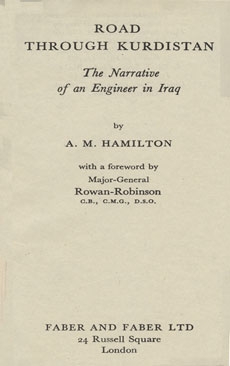| FOREWORD
The Hamilton road runs from the Arbela of Alexander past the home of Saladin to the Persian plateau... A wonderful engineering feat, it traverses on its way the gorges of Rowanduz and Berserini, two stupendous obstacles which might well have scared any adventurer even were he armed with the most modern appliances and supported by an army of trained and expert workmen.
Mr. Hamilton, however, was equipped in modest fashion and, as the solitary European of the party, had to teach the arts of hill-blasting and of road-making as he proceeded. He alone could reconnoitre the gloomy depths of the canyons for possible lines of passage. He alone had to supervise operations, control, pay and feed his gangs. He was at once the leader, the father, and the mechanic; and, for some five years in the blazing heat of summer and in the icy blasts of winter, isolated among savage tribes, he played these responsible parts till he brought his great work to completion.
I had the privilege of meeting him during operations in Kurdistan. Then, when that most unruly of all lands was in a state of violent fement, when Kurds were fighting Arabs and Kurds were killing Kurds, when outside a fortified encampment or a village every man took his life in his hand and went armed to the teeth, peace and order reigned along the road that Hamilton was building. His motley collection of Persians, Kurds, Assyrians and Arabs passed to and fro unarmed and unperturbed. In the successful pursuit of a great material aim he had unconsciously won the moral battle. His leadership, his personal skill, his sense of justice and his continual regard for the welfare of his men had not only procured him the respect without which the work could not have proceeded; but, over at least the period of his rule, it also had an ennobling effect upon these savage tribesmen. New Zealand may well be proud of the work of one of her sons upon a distant border.
The last two chapters need to be read with discrimination, for Mr. Hamilton was living in close contact with the Assyrians and felt their misfortunes keenly. Actually there was not only an Assyrian side but a British side and an Iraqi side to this troublous question. We have, however, a clear responsibility towards these ancient allies of ours; and, now that the Orontes scheme has fallen through, we cannot allow our conscience to rest until we shall have established them in a satisfactory home.
H. ROWAN-ROBINSON
ACKNOWLEDGEMENT
I have to thank all those who have so kindly lent me photo-graphs and I wish especially to thank Miss Ella Sykes for her invaluable. help in the preparation of this book.
A.M.H. | 